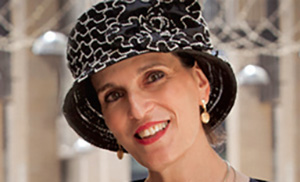

Review of ‘Yemima Mizrachi Speaks: Words of Torah. Words of chizuk. Words you have to hear.’ Adapted by Shiffy Friedman. (2016) Hardcover. 440 pages. Artscroll Mesorah Publications. ISBN-10: 1422618404.
Rabbanit Yemima Mizrachi has become a worldwide phenomenon, speaking to, guiding and inspiring literally tens of thousands of Jewish women all over the world. She’s got the presence of royalty, the delivery of a standup comic and charisma that politicians would envy. But much more than all that, what she’s really got is Torah, its wisdom and its eternity, and her own obvious and sincere love for Torah that comes through in her every word.
And here is some great news for the tens of thousands of women who have heard her—and even greater news for those who have not yet enjoyed the privilege of hearing this dynamic, world-famous speaker: You can now “hear” Yemima speak, in the comfort of your own home, in ArtScroll’s new release, “Yemima Mizrachi Speaks,” based on her shiurim and beautifully adapted for print by Shiffy Friedman.
So, how do I review a book that is so rich in spiritual treasure? Let’s look at just one parsha. What does “Rabbanit Yemima” have to tell us about Parshat Vayechi?
First, Yemima-like, she pulls our emotions into the story of Yaakov surrounded on his deathbed by his 12 sons, bringing the emotion of the moment into our understanding of the pesukim. And then she segues effortlessly into our own challenges: “The neshamot of this generation, however, are not the neshamot of yesteryear. The souls we brought into this world are tired, oh, so weak and tired. Have you noticed how weary their faces look? I see girls of 15 and boys of 16 who look like they’ve gone through life’s greatest traumas. They stuff themselves with vitamin C before a test, vitamin B after and omega-3 during…”
But this is more than just another “kids are so messed up today” essay. Because, in Yemima’s uniquely optimistic worldview (actually, not Yemima’s; the Torah viewpoint, as she shows us, is always optimistic!), it is from this weakness that—yes!—Mashiach will come. And then she teaches us how real strength comes from admitting weakness—an emotional truism and a Torah truth.
In parsha after parsha we see the world through the eyes of Torah and its commentators, and we are amazed at the contemporary insights that the rabbanit finds in their words.
One of the many joys of this work is its orientation toward women’s challenges and strengths. Where else would you find such a lyrical description of the Imahot: “From Sara, you receive the power to laugh. From Rivka, the power to give birth and tend to your children. From Rachel, you receive the power to cry, and from Leah you receive the greatest power of all: the strength to wait. My dear sisters, the numerical value of the word vayechi is ko’ach. You cannot fathom the strength that Hashem sends your way on this Shabbos. What strength you have, dear women! Chazak chazak v’nitchazek!”
Pure Torah. Pure Yemima.
And pure delight for all of us.
By Malky Prager










